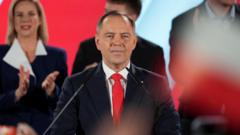Poland's recent presidential election delivered results that underscored the political divide in the nation, as exit polls showed a razor-thin margin between the candidates.
Poland's Presidential Race Tightens, Signaling Divided Voter Sentiments

Poland's Presidential Race Tightens, Signaling Divided Voter Sentiments
Tension rises as Poland's presidential election results indicate a near tie, spotlighting the nation's political polarization.
In a decisive moment for Polish democracy, Sunday’s presidential election has emerged as a cliffhanger, with exit polls suggesting the two candidates are in a virtual deadlock. Rafal Trzaskowski, the liberal mayor of Warsaw, claims a slight lead in the runoff election, but the numbers are so close that the final result remains uncertain pending an official count.
Trzaskowski confidently addressed his supporters, proclaiming, “We won!” and suggesting that this close contest will lead to the term “razor-thin victory” being woven into Polish vernacular. Exit polling indicated Trzaskowski garnered 50.3% of the vote while his opponent Karol Nawrocki—a historian backed by the right-wing Law and Justice party—scored 49.7%. In response, Nawrocki remained optimistic, assuring his supporters that the official tallies would favor him, stating, “Tonight we will win and save Poland.”
The voter turnout reached an impressive 72.8%, marking the highest engagement in a Polish presidential election since democratic elections began in 1990. This election is critical, viewed broadly as a referendum on the traction of populist nationalism within Europe. It mobilized a coalition of Trump supporters and right-wing politicians who lent their backing to Nawrocki’s campaign, contrasting with mainstream European political figures supporting Trzaskowski.
The election's outcome hinges on voter sentiment towards candidate collaboration with centrist leadership, represented by Prime Minister Donald Tusk, or a desire for opposition. The nail-biting closeness of the results exposes the deep-seated polarization in Poland between nationalist ideologies and centrist philosophies.
Should Trzaskowski win, his presidency, backed by Tusk’s Civic Platform party, could dissolve the political stagnation that began when Law and Justice lost its parliamentary majority in 2023 while still maintaining the presidency’s authority to veto legislation. Conversely, a Nawrocki victory would perpetuate this deadlock, continuing the influence of a populist agenda in Polish governance.
The world watches closely as the results unfold, illustrating the broader implications for political dynamics across Europe.




















